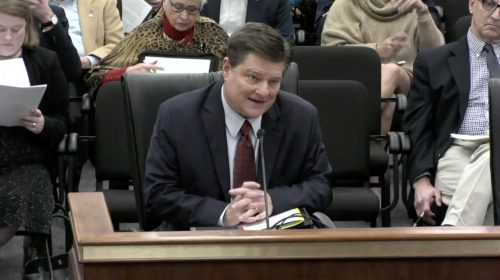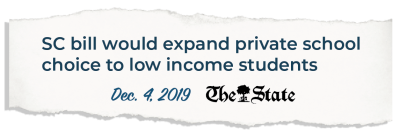A gamechanger for South Carolina students
Yesterday, a S.C. Senate Education Subcommittee resumed public testimony on S.556, a bill to create Equal Opportunity Education Scholarship Accounts (ESAs). Parents, pastors, principals, and both local and national education policy experts testified about the practical way ESAs could transform educational opportunities for low-income, special needs, military, and foster care students in South Carolina.
The State’s article on the hearing appeared on the front page of that newspaper yesterday, including a statement from PPI’s Dr. Oran Smith, who also testified at the hearing. You can read it here.
There is expected to be another subcommittee meeting in the next couple of weeks to refine the bill’s language, and we hope to see Education Scholarship Accounts before the full Education committee in early 2020.
Here are some of the highlights from the testimony we heard yesterday.
It’s about students.
Dr. Cara Candal, an education policy expert with ExcelinEd, traveled from Boston to testify to the subcommittee, focusing on how ESAs have worked in other states. Highlighting South Carolina’s neighbors (TN, MS, FL, & NC) where ESA legislation has been passed, she showed that there were remarkable improvements in student learning for public school students as well as the general student population. Her standard?: What is best for kids. Dr. Candal had this to say in her testimony:
“School choice, and education, should be about is what is best for kids… and this ESA program will be a gamechanger for South Carolina. It’s good for kids and it’s good for families.”
As PPI’s Dr. Oran Smith was quoted as saying in The State’s article, the ESA bill will only benefit the students who need it most—those who are poor or have special needs, and only those who are currently in public school. The cost for providing real options for the most vulnerable kids in our state would be no more than about 1% of state education revenues, he said.
It’s about families.
Candace Carroll, a mother of a child with autism, also testified to the subcommittee. She explained that her family had to move out of the Clemson area so that her daughter’s educational needs could be met. She had this to say at the hearing:
“We know far too many children are assigned to schools that are unable to meet their educational needs… As a mother of a child with autism, I understand the barriers that parents face to get a quality education. The traditional one-size-fits-all system doesn’t work for my family.”
We also heard from Pastor James Wooten from Westgate Baptist Church in Spartanburg who gave a heartfelt reminder of the primary role of parents in education decisions. He shared a story about a family in his church who sadly lost the opportunity to send their kids to a school where they are taught from a Christian worldview, because they can no longer afford it…and how an ESA could change that.
Dr. Shaunette Parker, Executive Director of My SC Education, as well as a mother and educator, also testified about the importance of an ESA for children whose education needs aren’t being met:
“What parents need to hear is that lawmakers understand that their child’s education is a demand for respect; it is a demand for opportunities, a demand for economic gains; and most of all, education is a demand for freedom. Parents need to hear that they live in a state that will do all it can to make it possible for all children to access a high-quality, competitive, and effective education.”
Here’s how you can help.
As we look forward to the next subcommittee hearing, lawmakers need to hear from you. They are certainly hearing from the defenders of the education status quo.
If you’d like to learn more about education choice and ESAs, please click here.








